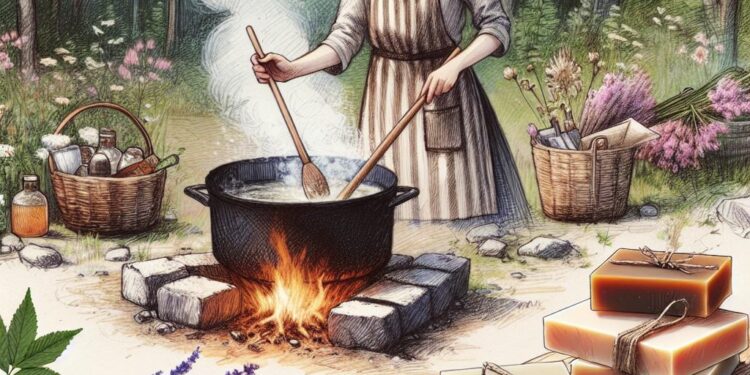Imagine being miles from civilisation and realising you’re out of soap. Knowing how to make soap from natural ingredients isn’t just a quirky skill but a valuable one in survival or preparedness scenarios. In emergencies or off-grid situations, keeping clean can prevent illness and infection. However, many overlook the importance of understanding the right natural materials or techniques, often leading to mistakes. This blog deciphers the art of soap-making, offering practical advice and realistic solutions. It’s all about being prepared, making smart choices, and empowering you with skills that can make a significant difference when life gets challenging.
How Is Soap Made Naturally?
Making soap from natural ingredients is a nifty skill that goes hand in hand with survival, emergency prep, and off-grid living. Imagine you’ve been out in the woods for days—no shops, no running water, and certainly no soap. That’s where your soap-making skills come in handy. This isn’t your average bar of Dove; it’s something you’ve whipped up using things like lard, beeswax, ash, and rainwater. These might sound like ordinary materials, but when combined, they form a powerful cleansing tool. Visualize melting animal fat and mixing it with lye derived from wood ash—a classic method that’s both practical and rewarding. Not only does this craft save you from relying on store-bought soap, but it also provides a sense of independence and self-reliance. Plus, if you’re in the midst of a survival situation, having freshly made soap can be a morale booster. Your hands might be dirty, but your skills keep you secure.Survival Benefits of Natural Ingredient Soap Making
Soap is vital in survival situations. Making it from natural ingredients offers many benefits, enhancing your wilderness experience. Here’s why it’s so advantageous:- Survival Readiness: Knowing how to make soap from natural materials in the wild prepares you for unforeseen situations. You won’t have to worry about hygiene even when modern conveniences aren’t accessible.
- Safety: Natural soap ingredients reduce the risk of chemical reactions that could occur with synthetic compounds. It ensures you’re using skin-friendly materials that won’t harm you in rough conditions.
- Gear Efficiency: Carrying raw materials like ash or animal fats is often easier than hauling heavy soap bars. This can lighten your pack, making hiking and traveling less burdensome.
- Health in Emergencies: Soap is essential for maintaining hygiene, especially in emergencies where infections can easily spread. Crafting it yourself means you always have a supply for cleaning wounds.
- Reduced Reliance on Modern Systems: By mastering this skill, you become less dependent on commercially manufactured products, enabling a more self-sufficient lifestyle and minimizing your need for stores and supplies.
- Cost Efficiency: Collecting natural materials from your surroundings can be free, reducing expenses and resource use, thus achieving an economically sustainable practice.
- Improved Wilderness Experience: Engaging in the process of making natural soap can deepen your connection to nature, fostering respect and appreciation for the environment around you.
Crafting Daily Soap: The Natural Way
- Incorporate soap-making into weekend projects or hobbies, using local natural ingredients like herbs and essential oils to create a personalised touch. This can be done both in urban balconies and rural gardens.
- Stock your survival kit with homemade soaps, ensuring you have a sustainable and chemical-free option for maintaining hygiene in the wild or during emergencies.
- Teach children or friends about natural soap-making at a family gathering; it’s an educational yet fun activity suitable for both city parks and countryside backyards.
- Plan a soap-making session as part of your yearly camping trip, for city dwellers and countryside residents alike, to embrace nature-friendly traditions.
- Regularly use homemade soaps at home, which supports a sustainable lifestyle and reduces dependency on store-bought products, benefiting both city and rural living.
DIY Soap Tips & Guided Use from Nature’s Ingredients
Sure! Here are some quick, DIY-friendly tips for using “Making Soap from Natural Ingredients” and when expert guidance may be necessary:- Follow simple recipes with easy-to-find ingredients like olive oil and essential oils for a basic soap-making experience.
- Use molds or containers you already have at home, like silicone baking molds, to shape your soap.
- Try adding natural exfoliants, such as oats or coffee grounds, for a textured feel.
- For campers or solo travelers, consider small, portable molds for easy packing and use on the go.
- If working in remote areas, or if you’re new to soap-making, seek guidance from a survival course or pro gear when handling lye or other reactive substances.
Affordable & Time-Saving Natural Soap Making
When preparing to make soap from natural ingredients, consider the costs and time investment with the following helpful guide.| Aspect | Cost/Time Effort |
|---|---|
| Learning Process | Minimal cost; primarily time invested in reading and watching tutorials. Approximately 3-5 hours. |
| Ingredient Purchase | Varies depending on locality and organic options. Estimated £10-£20 for basic natural ingredients. |
| Equipment/Tools | Initial setup cost for soap making gear like molds and measuring tools. Estimated total cost: £15-£30. |
| Time to Make Soap | Including preparation, mixing, and curing, it usually takes between 4-6 weeks for the soap to be ready for use. |
| Environmental Impact | Low, due to the use of natural ingredients and avoidance of chemicals. |




